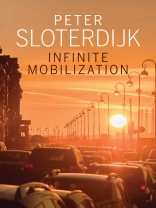The core of what we refer to as ‘the project of modernity’ is the idea that human beings have the power to bring the world under their control, and hence it is based on a ‘kinetic utopia’: the movement of the world as a whole reflects the implementation of our plans for it.
But as soon as the kinetic utopia of modernity is exposed, its seemingly stable foundation cracks open and new problems appear: things don’t happen according to plan because as we actualize our plans, we set in motion other things that we didn’t want as unintended side-effects. We watch with mounting unease as the self-perpetuating side-effects of modern progress overshadow our plans, as a foreign movement breaks off from the very core of the modern project supposedly guided by reason and slips away from us, spinning out of control. What looked like a steady march towards freedom turns out to be a slide into an uncontrollable and catastrophic syndrome of perpetual mobilization. And precisely because so much comes about through our actions, these developments turn out to have explosive consequences for our self-understanding, as we begin to realize that, so far from bringing the world under our control, we are instead the agents of our own destruction.
In this brilliant and insightful book Sloterdijk lays out the elements of a new critical theory of modernity understood as a critique of political kinetics, shifting the focus of critical theory from production to mobilization and shedding new light on a world facing the growing risk of humanly induced catastrophe.
Table des matières
Premises
I. The Modern Age as Mobilization
1. The Mobilization of the Planet from the Spirit of Self-Intensification
2. Sketches towards a General Outline of a Critique of Political Kinetics
3. The Prospect of an Asian Renaissance: Towards a Theory of the Ancient
II. The Other Change
On the Philosophical Situation of Alternative Movements
1. Panicked Culture—Or: How much catastrophe does a person need?
2. The First Alternative: Metaphysics
3. The Second Alternative: Poeisis
III. Eurotaoism?
1. Nothingness and Historical Consciousness – A Note on the World History of Life Fatigue
2. The Miscarried Animal and the Self-Birth of the Subject
3. Eurotaoism
IV. The Fundamental and the Urgent – or: The Tao of Politics
Also a contribution to the answer as to why a credible policy currently does not exist
1. Dimensions of the Gap in Credibility
2. The Voting Voice and the Body— or: How politics takes part in the crisis of a metaphysics of embodiment
3. From an Ethics of Principle to an Ethos of the Urgent
V. Paris Aphorisms on Rationality
1. All that is right
2. Diplomats as Thinkers in Meager Times
3. Low Theory
4. La chose la mieux partagée du monde
5. Geometry as Finesse
6. Unconcealment
7. Of the foolishness to not be an animal
8. Invent yourselves
VI. After Modernity
1. The Age of the Epilogue
2. The Interim – or: The Birth of History from the Spirit of Postponement
3.Truth und Symbiosis: On the Geological Abolition of World History
4. For an Ontology of Still-Being
A propos de l’auteur
Peter Sloterdijk is Professor of Philosophy and Aesthetics at the Karlsruhe School of Design. He is one of the most influential philosophers writing today and is the author of many books including
The Critique of Cynical Reason,
In the World Interior of Capital,
Spheres,
You Must Change Your Life and
What Happened in the 20th Century?












